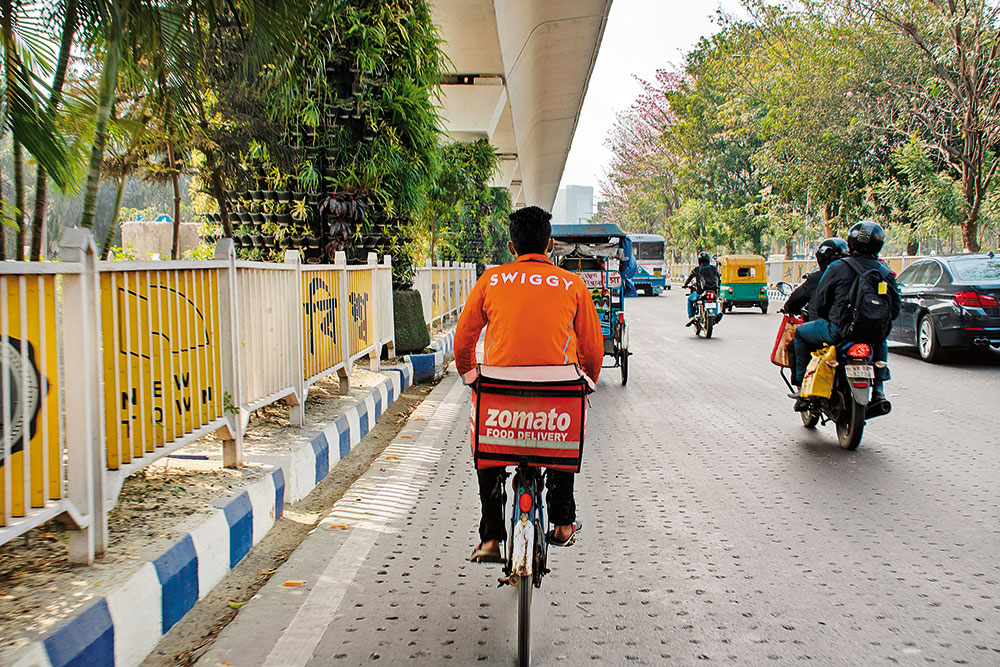Economics Nobel laureate Robert Coase had once bemoaned that his most famous work The Nature of the Firm was more eminent than prevalent—“much cited, little used”, he is reported to have said. His simple and yet brilliant idea was that firms exist to minimise transaction costs, especially when it comes to labour. It was more economical for firms to have permanent employees as it did not require them to negotiate new contracts in dynamic labour markets.
Coase’s work won renown much later, but no better vindication to his work has come than from the internet-enabled platform economy which has made it extremely easy for entrepreneurs and contract workers to minimise search, information and bargaining costs.
This has immense significance for developing nations such as ours, which have incredible young demographics—a median age of 28 years indicates peak earning years ahead. As India continues its onward march, it will be important for the new government to ensure that our youngsters get opportunities to fulfil their dreams and maximise their potential.
India needs to create the Horatio Alger stories, popular in the early 20th century in the United States, which were to become the metaphor for the American dream—individuals born in disadvantaged circumstances can achieve upper-middle-class respectability in their lives through valiant perseverance and a sedulous work ethic.
Breaking Free
Tech platforms can play an important role in large-scale job creation which our country needs. In the short duration of their existence, homegrown technology platforms in India, especially those that operate in the gig economy, have created employment in the organised sector, improved incomes and stimulated entrepreneurship. For several youngsters across India, platforms have been an excellent opportunity to top low incomes from a first job and/or to ensure consistent earnings if other sources dry up.
A youngster who may have been shackled and inhibited by oppressive structures in feudal settings that afflict hinterlands gets an opportunity to learn new skills, to become a part of the formal economy and gets flexibility to combine it with education or other forms of training or employment. International examples show that employment generated through the platform economy contributes to closing the gender gap as it enables women to overcome constraints of traditional labour markets.
Take, for instance, food delivery and quick commerce. As a youngster moves from the village to the city, an association as delivery partner is often their first tryst with the organised sector—a job which gives them earnings in their bank account, insurance protection, opportunities to earn rewards for strong performance and a flexibility to manage working hours. The flexibility, in fact, also allows many people to supplement their incomes where they undertake select gigs over weekends or after work hours.
Other Side of the Platform
There is an equally remarkable story on the other side of the platform—where many new businesses have been set up and prospered. Platforms lower entry barriers and promote local private sector development while enhancing inclusion. Small restaurant owners who may not always have funds to invest in delivery fleets, prime real estate shop fronts or sales promotion are now running successful businesses as the platform has enabled easy discovery and removed these privations.
New businesses are emerging, and the existing ones are enhancing their reach as the platform allows them to subsidise their fixed costs and increase the serviceable area. There are other heartening developments too. For instance, many women entrepreneurs are emerging—in many cases in Tier-II and Tier-III cities and in most cases, this being their first venture.
Similarly, quick commerce has given a fillip to the emergence and development of homegrown fast-moving consumer goods (FMCG) brands, that would often struggle to find shelf space in traditional shop fronts which were dominated by products of big companies. The platform has democratised access and led to better business and improved reach for these brands, in turn helping create a virtuous cycle of investment and job creation. Home services, logistics, ecommerce are some of the other tech platform examples which are creating employment, entrepreneurship and empowerment.
Enabling Environment
Many tech platforms have now given India a well-deserved reputation as one of the major start-up hubs in the world. This could not have been possible without an enabling environment created by the government. As India starts the next chapter of her growth, these start-ups can make an even bigger contribution than they have done thus far, especially in terms of creating new jobs in the organised sector—the Indian economy’s biggest requirement.
Policies from the new government that are based on appreciation of these platforms’ homegrown status, the short duration of their existence (most of them are less than a decade old), their limited consumer base and revenues especially when compared to their global counterparts will go a long way in them being able to contribute to India’s onward march.
Even as an investor and supporter of innovation, the government’s role will be critical. The argument that it is the private sector which brings in all the innovation and market creation has deservedly been discredited. In her outstanding work, The Entrepreneurial State, economist Mariana Mazzucato has shown that private sector investment usually follows the government. Giving instances of various revolutions—space age, biotech, internet and nanotech, she highlights that it was the government which made the first investments, took risks and supported innovation which led to subsequent private sector breakthroughs. The tech platform economy also needs support and backing from the government.
Its alliterative appeal apart, the phrase demographic dividend has a very limited-time window. The target for the new government is very clear: to help create as many jobs as possible for our youngsters. In this pursuit, it will find the platform economy ecosystem to be an excellent partner.
Rohit Kapoor is CEO-Food Marketplace, Swiggy











